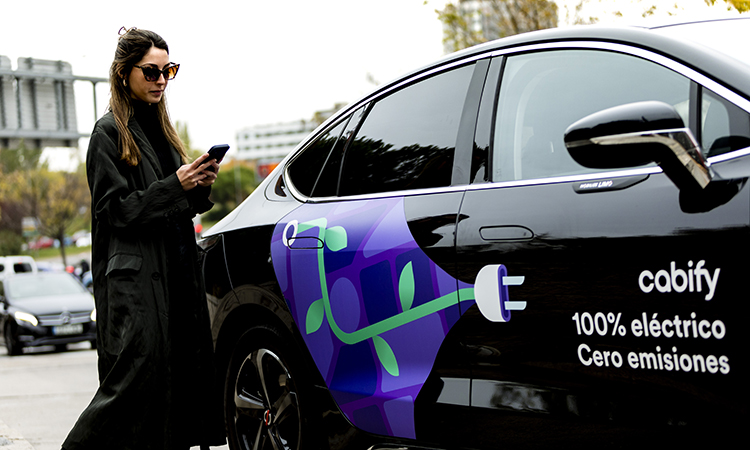On-demand shared mobility can play a key role in success of Low Emission Zones, says new study
- Like
- Digg
- Del
- Tumblr
- VKontakte
- Buffer
- Love This
- Odnoklassniki
- Meneame
- Blogger
- Amazon
- Yahoo Mail
- Gmail
- AOL
- Newsvine
- HackerNews
- Evernote
- MySpace
- Mail.ru
- Viadeo
- Line
- Comments
- Yummly
- SMS
- Viber
- Telegram
- Subscribe
- Skype
- Facebook Messenger
- Kakao
- LiveJournal
- Yammer
- Edgar
- Fintel
- Mix
- Instapaper
- Copy Link
Posted: 19 September 2023 | Intelligent Transport | No comments yet
The study outlines that on-demand shared mobility services, together with collective public transport, can help to maximise the net benefits of traffic restriction measures, such as LEZs.


Credit: Cabify
A research group at the University of Barcelona (UB), in collaboration with Cabify, has analysed the role that private hire vehicles (PHVs) and taxis could play in implementing low-emission zones (LEZ). So far, LEZs have been implemented in 14 cities in Spain, while another 135 will have to implement them in the coming months.
The study reveals that, together with collective public transport, on-demand shared mobility services – including micro-mobility and personal mobility – can become great allies in the management of efficient mobility that aims to maximise the net benefits of implementing traffic restriction measures, such as LEZs.
According to a report published by The Clean Cities Campaign between 2019 and 2022, the total number of active LEZs in Europe increased by 40%, from 228 to 320. By 2025, 507 LEZs will be in place in Europe (which means a 58% increase compared to June 2022), namely due to new national laws in France, Spain and Poland that mandate or support the adoption of such schemes.
“PHVs and taxis can be a decisive factor in achieving the objectives of reducing pollutant emissions, so it is essential to address them as strategic actors in urban mobility and that local governments take into account their ability to contribute when regulating the LEZ”, says Marc Tarrés, a researcher at the University of Barcelona and co-author of the study.
In practice, the evidence shows that LEZs reduce pollution because they encourage vehicle fleet renewal. Still, they do not always reduce traffic levels or congestion, either because the purchase of new vehicles allows circumventing the restriction or because of a traffic shift from the restricted to the unrestricted zone. Therefore, it is necessary to complement the LEZs with other measures, such as improved collective public transport services. However, the necessary resources are not always available to achieve this objective.
The study confirms that on-demand mobility services (PHV and taxis) can become a better mobility alternative than collective public transport for some demand segments; complement collective public transport; achieve a more efficient match between supply and demand than collective public transport through digital platforms; promote a lower demand for privately owned vehicles; and contribute to a better traffic composition.
Likewise, on-demand mobility services and digital platforms increase the efficiency of the chauffeur-driven transport vehicle sector by using less polluting vehicles, traveling a shorter empty distance between services or having a system that discriminates between peak and off-peak hours.
PHVs and taxis are also essential for the mobility of citizens who cannot drive, either due to disability, lack of license, age or alcohol consumption, among other reasons.
“PHVs and taxis can compete with public transport when it is deficient or complement it, facilitate the ‘last mile’ and cover underutilised routes,” says Xavier Fageda, a researcher at the University of Barcelona and co-author of the study. In addition, they can reduce the purchase of private vehicles by up to 3%. PHVs, taxis, car-sharing and bike-sharing services reduce congestion and CO2 emissions, with a decrease of up to 7% in congestion and 6% in emissions, making them an efficient tool to implement LEZs.
This research, in collaboration with Cabify, was commissioned by the Fundació Bosch i Gimpera (FBG) of the University of Barcelona to the Research Group on Governments and Markets (GiM) of the Faculty of Economics and Business of the UB, the Observatory of Analysis and Evaluation of Public Policies and the Research Group New Regulations in Urban Transport (NURETU) of the Faculty of Law of the UB.
Related topics
Air Quality, Mobility Services, On-Demand Transport, Public Transport, Sustainable Urban Transport, Traffic Management, Transport Governance & Policy
Related modes
Taxi
Related organisations
Cabify, Clean Cities Campaign, University of Barcelona (UB)
Related people
Marc Tarrés, Xavier Fageda








